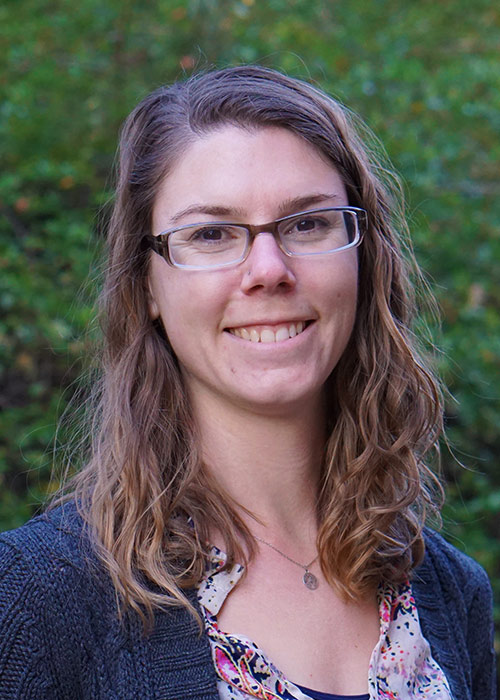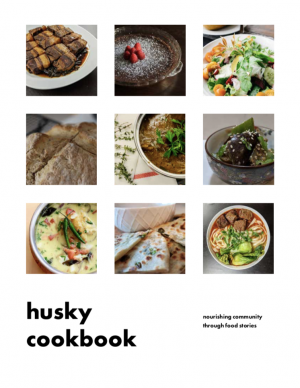
Why did you choose UW?
UW has one of the best coordinated dietetics programs on the west coast. Not only does the program prioritize bringing in master’s students from a wide variety of backgrounds, it is also known for its strong focus on clinical dietetics. For me, both of these priorities hit the mark.
I completed an undergraduate degree in international development studies and Spanish and then spent several years working in nonprofit fundraising and community development. Making the transition to a science-centered field of study was not easy, but I am thankful that this program values and leverages the various skills and experiences that each student brings with them. My goal from the start has been to practice as a clinical dietitian, and the UW program allows its students the opportunity to work with some of the top teaching and trauma hospitals in the country including UW Medical Center, Harborview Medical Center, and Seattle Children’s Hospital.
What excites you about nutrition?
I love food. I think we probably all do. It provides comfort and pleasure and can serve to bring community together. It is an integral part of our culture and is something that we engage with — must engage with — every single day. But beyond being necessary to survive, food has the potential to dramatically change our health, for the better or worse. Without downplaying the incredible advances in medicine, nutrition is a factor that can often be overlooked in this field. We are just starting to understand all of the different ways that nutrition can impact our health from research into the microbiome to our continually developing understanding of how different macro and micronutrients interact with our body at the metabolic level. Not only is nutrition support a critical aspect of the healing process in those who are injured or critically ill, but in certain medical conditions, nutrition therapy is an essential component of lifelong disease management. I am very excited to become part of a medical team working to help families and children manage difficult medical conditions in order to live the best life possible.
What inspired you to pursue a Master of Science degree in Nutritional Science?
Not getting into too many details, I have been dealing with many of my own health issues over the past ten years. Until a few years ago, I was having little success with conventional medical tests and treatments. At that time, I started to do my own research and stumbled upon the idea of food as a form of medicine. By changing the way that I was eating, I was able to resolve, or at least better manage many of my symptoms. And as I started talking to others about this experience, I found that so many people are dealing with similar health issues. Since then, I’ve come to learn that there is so much more to the world of medical nutrition therapy than recommending dietary changes, but seeing first-hand the impact that some small changes had on my own life inspired me to learn how to help others improve their health as well.
Tell us about your internship and/or research work.
For my master’s thesis work, I am proud to have had the opportunity to play a leading role in a clinical research study and to have been involved at all stages of the project from the beginning, including planning, IRB application, participant recruitment, data collection and analysis and hopefully eventually publication. My thesis research is a pilot study aimed at laying the groundwork to explore the impact of food additives on the development and ongoing management of celiac disease.
There is some evidence that celiac disease is triggered by environmental factors, one of which may be food additives, though there is little existing research on the topic so far. For this study, we collected 3 day food records from 26 children/youth, half with celiac disease and half without. The study will compare the macro and micro nutrient content, and amount of food additives consumed by each group. Results of this study will inform the need for additional research on the topic which in turn has potential to inform dietary recommendations for children with celiac disease.
I completed my clinical and medical nutrition therapy (MNT) rotations at Harborview Medical Center as an intern in the inpatient dietetics office where I gained experience working with patients on the medicine/surgery, neurosurgery and ICU floors. Currently, I am interning with a community health center with the Women, Infants and Children (WIC) program and will finish my time completing a management rotation at Seattle Children’s Hospital.
What area of nutrition do you envision pursuing after completing your degree?
I plan to work as a clinical dietitian, with a focus on pediatrics and chronic gastrointestinal (GI) disease or cystic fibrosis management. At this point, it is difficult to be any more specific, but I’m looking forward to joining the workforce to gain additional experience as I narrow down my interests, and gain the skills needed to specialize. As most new graduates do, I will likely start out working as a generalist and specialize as I gain more experience working with a specific population.
You were also involved in the Husky Cookbook project which was released last spring. How did you get involved in that, and what can you tell us about the project?

My colleague, Ivory Loh, was inspired to create a community cookbook based on an activity in our food and society class during the first quarter of the program. After applying and receiving a Husky Seed Fund grant, she asked me to join the project as the design lead. I have dabbled in some design projects in the past both for work and for fun, so I was only too happy to be a part of such an inspirational project. We received over 60 recipe submissions, nearly all of which are featured in the printed cookbook.
How would you describe your experience in the program?
Overall, I have been very pleased with the program, and particularly with the internship opportunities that are available. The classes are not easy by any means and the coursework can be intense, but the faculty is always very supportive. Being part of such a small cohort (15) has also been a blessing as I have not only had the opportunity to study and learn from a great group of peers, but I have also developed relationships and friendships with many who will one day be my colleagues.
Tell us a few fun facts about yourself
I spent a year living in Venezuela as an exchange student after high school. When I’m not reading textbooks or articles for class, I love to read post-apocalyptic novels for fun.
What do you like to do for fun in Seattle?
My favorite activity in the Seattle area is hiking. There are so many trails and beautiful places to explore! I also really enjoy wandering around the city and exploring new neighborhoods by checking out the local coffee roasteries. Seattle also has the best vegan ice cream I’ve ever had, so if I ever happen to wander by Frankie & Jo’s, I always stop to try their newest seasonal flavors.
What advice would you give a student considering the UW Nutritional Sciences Program?
While the program has a strong clinical focus, it is also housed within the School of Public Health, which provides a more holistic viewpoint of healthcare. This provides a great opportunity to explore a wide range of interests, and also allows the program to be tailored to the specific interests of each student. For me, coming into the program with a clear idea of my interests and what I hoped to get from the program has been an advantage as I’ve been able to work closely with the faculty to pursue those goals and interests. This program will broaden your knowledge and help you develop new interests along the way, but my personal advice is to have a few specific goals or areas of focus coming into the program so that you are prepared to take advantage of the opportunities that best align with those goals.
Interested in studying nutrition as a graduate student? Explore our graduate study and RDN training offerings in the Nutritional Sciences Program.